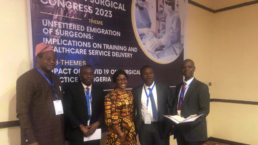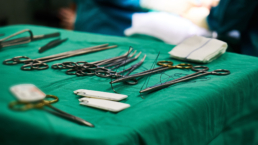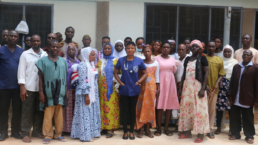Watch the GECKO Study National Leads Webinar Session Online
National Leads from the GECKO Study meet to discuss questions they have following on from the launch of the study in new webinar video
The online meeting that took place on the 31st July enabled all National Leads to ask a variety of questions to a panel of colleagues from the Operational Committee residing over the new study. Questions included issues relating to Data Transfer Agreement documentation, data validation, obtaining REDCap logins and information on data required for the 1 year follow-up for eligible patients.
The webinar is the first in a series of recordings that will be added to the official NIHR Global Health Research Unit on Global Surgery (GSU) Youtube page that will provide information on the study as it progresses, with the general aim of the webinar series being to help provide an additional method for participants of the study to access information that may assist them during the study.
The GECKO Study (GlobalSurg-4) is an international observational cohort study that has already recruited over 1800 centres across 133 countries. The GlobalSurg Network collaborators will come to collect contemporaneous data on the performance and outcomes of cholecystectomy.
Further information on GECKO can be found by clicking here.
Watch the FOxTROT II Oncology Introductory Session Online
Lead Medical Oncologists from the UK and India discuss new trial looking to reduce likelihood of cancer returning in operable patients undergoing treatment for colon cancer
FOxTROT 2 will be conducted across 12 hospitals in India that include sites within the NIHR Global Health Research Unit on Global Surgery network. The trial will look into the use of a short course of pre-operative (neoadjuvant) chemotherapy for old/ or frail patients due to undergo surgery for colon cancer, with the aim of the trail being to significantly decrease the likelihood of the cancer returning.
The meeting on the 19th July was lead by a Professor of Oncology based at the University of Leeds in the UK who is also the Lead Medical Oncologist for FOxTROT Trial Platform, and was Chaired by Professor Dhruva Ghosh (GSU India Hub Director). Also in attendance were various colleagues from across India and the UK that will be participating in this international project.
The online training session gave colleagues in attendance the chance to be taken through an overview of the of the trial and also discuss the Oncology requirements for FOxTROT, due to officially launch in the coming weeks. The online video provides insight for stakeholders within the arena of global surgery to gain an understanding of some of the topics that are key to discuss during the early stages of designing an international randomised trial.
You can find out more on the India Hub by clicking here.
GSU Present on Collaborative Research During Scientific Conference Held in Nigeria
GSU Co-Director and Nigeria Hub Director discuss the GSU’s role in collaborative research at the 18th Annual Scientific Conference Gathering held at the University of Lagos.
Professor Dion Morton (GSU Co-Director) and Adesoji Ademuyiwa (Nigeria Hub Director) were able to join Dr. Ismail Lawani (Benin Hub Director) at the Conference that was held at the Sheraton Hotel in Lagos. The conference theme was on “The Impact of Collaboration on Clinical Research” and featured a guest lecture delivered by Professor Morton on the subject “Local Experiences in Genomic Studies”, in addition to Professor Ademuyiwa who was also able to speak during the meeting.
The annual Conference, hosted by the Faculty of Clinical Sciences, College of Medicine (CMUL), University of Lagos (UNILAG) brings together colleagues from across the University to take part in various scientific sessions that include panel discussions and an exhibition. The event also provides a platform for the Faculty to showcase achievements and contributions made throughout the year during the awards ceremony that also took place, prior to the event’s conclusion.
You can find out more information by clicking here.
For more information on the Nigeria Hub, click here.

Project of the Month Overview: Rural Surgery
July’s ‘project of the month’ shines a spotlight on the GSU’s work that has established pathways to rural communities in low- and middle-income (LMIC) countries
Rural surgery is a growing area of research within the NIHR Global Surgery Unit. Based on previous studies co-ordinated across the Unit such as FALCON and CHEETAH, data has been obtained from many centres based in rural areas across the organisation’s global network. Structures, process and outcomes from these centres are not known and there is a need for further research into this. Rural based communities are often under-represented within surgical based research, despite the fact that so many patients within LMICs may reside within rural settings.
Currently, work is being carried out on data from approximately 17K patients enrolled on both FALCON and CHEETAH to understand the patient-level factors and operative-level factors that govern these centres. Various colleagues from across the Unit are also working on further data to set research priorities in rural surgery that will help influence research carried out across the network.
The Rural Surgery Operations Team are looking to release a publication in the next few months, in addition to a Delphi planned thereafter to engage the network and further afield.
More information on the Unit’s work across rural communities can be found by clicking here.
GECKO Study Launch Webinar Video Available to View Online
Online video for the launch webinar provides a detailed oversight of the study that will look into the safe provision of laparascopic surgery for gallbladder disease
The online webinars that took place on Tuesday 18th July attracted a global audience of over 500 participants who were given the opportunity to ask questions to the global panel members leading the study. In addition to the panel discussions, participants were given information on the ethics required, how to enter data onto REDCap and areas of clinical practice where data will be collected. Particular areas of data collection that were discussed during the webinar included bile duct injury and incidental gallbladder cancer.
During the meeting, Mr Ewen Griffiths (Birmingham University Hospitals NHS Foundations Trust) explained why the Global Evaluation of Cholecystectomy Knowledge and Outcomes (GECKO) Study is being launched. He also explained why the study will be of great importance in highlighting the variations of safe provision of laparascopic surgery for gallbladder disease internationally, including low- and middle-income countries.
The study has already recruited over 1800 centres across 133 countries, making it the largest global cohort study to launch within the GSU to date. If you would like to register for the new study, you can still do so before the project officially launches on Monday 31st July.
The online video can be viewed by clicking here.
You can read more on the GECKO Study by clicking here.
Nigeria Hub Data Centre Officially Opens in Lagos
Nigeria’s Data Centre draws crowd for it’s official launch day, ahead of formal training beginning for students
The Nigeria Hub officially opened the it’s doors on Tuesday 11th July to an audience of colleagues from Lagos University Teaching Hospital (LUTH) and College of Medicine University of Lagos (CMUL). Other colleagues in attendance were Chief Medical Director, Prof Wasiu Adeyemo, Chief Medical Advisory Committee of LUTH, Prof. Deji Oluwole, Provost of CMUL represented by Deputy Provost, Professor Sunday R.A. Akinbo, Dean of Faculty of Clinical Sciences College of Medicine the University of Lagos, Prof. Folashade Akinsola, Head of Department of Surgery College of Medicine University of Lagos, Director Finance of LUTH, Dr. Tajudeen Ibrahim and CMUL, Dr. Simeon Akinade
Following the official launch of the centre, a total number of 11 medical students will be trained by David Akinboyewa – Nigeria Hub’s Data Centre Strategist, as part of a bespoke training package that will enable each student to gain further insight into the various mechanics that are integral to data management research.
The Nigeria Data Centre will join the other existing centres in India and Ghana that will provide a formal training environment for data management, in addition to providing GSU collaborators improved access to datasets collected during international cohort studies. The centre forms an online home for the collection, analysis, evaluation and reporting of data in our Global Surgery projects. A key objective of the Unit is to share data to establish best practice, and ultimately, to improve outcomes for surgical patients worldwide.

You can read more on the Nigeria Hub by clicking here.
GECKO Launch Webinar - 18th July
The GECKO launch event will discuss key topics on the international observational study and feature talks from National Leads and Committee members
When is it?: Tuesday 18th July – 12PM UK BST (early session) and 5PM UK BST (late session)
Who should attend?: Surgeons, surgical researchers, surgical nurses, scrub techs, ODPs and allied healthcare professionals
The GECKO Study (GlobalSurg-4) will be an international observational cohort study. The GlobalSurg Network collaborators will come to collect contemporaneous data on the performance and outcomes of cholecystectomy.
The launch event will include a panel discussion featuring National Leads and Committee members who will discuss various aspects of this exciting new study that has so far managed to result in over 1650 hospitals sign-up to take part in the international study.
Register for the event by clicking here
You can also view further information on the study by clicking here.
Nigeria Hub Honoured with Plaque for Work Completed to Reduce Surgical Site Infections (SSIs)
Lagos Hub receives plaque during Association of Surgeons of Nigeria event where the team were able to disseminate results from GlobalSurg 2, FALCON and CHEETAH trials
The event that took place at the Sheraton Lagos Hotel between the 24th to the 27th June was attended by a range of stakeholders from across the Nigerian surgical network, with the Nigeria Hub team being led by Professor Adesoji Ademuyiwa and Deputy Hub Director, Professor Adewale Adisa.
The team took part in an hour long session to talk about the outcomes of GlobalSurg 2, FALCON and CHEETAH trials, in addition to hosting a discussion on the need for implementation of the outcomes in Nigeria. During the discussion, the Nigeria Team called for the implementation of the outcomes by Nigeria policymakers as well as Hospital Executives across the country.
During the event, the Nigeria team were also awarded a plaque for the work undertaken by the Hub to recognise their efforts in reducing SSIs and improving patient care across Nigeria. The plaque was received by Professor Adewale Adisa on behalf of the team.
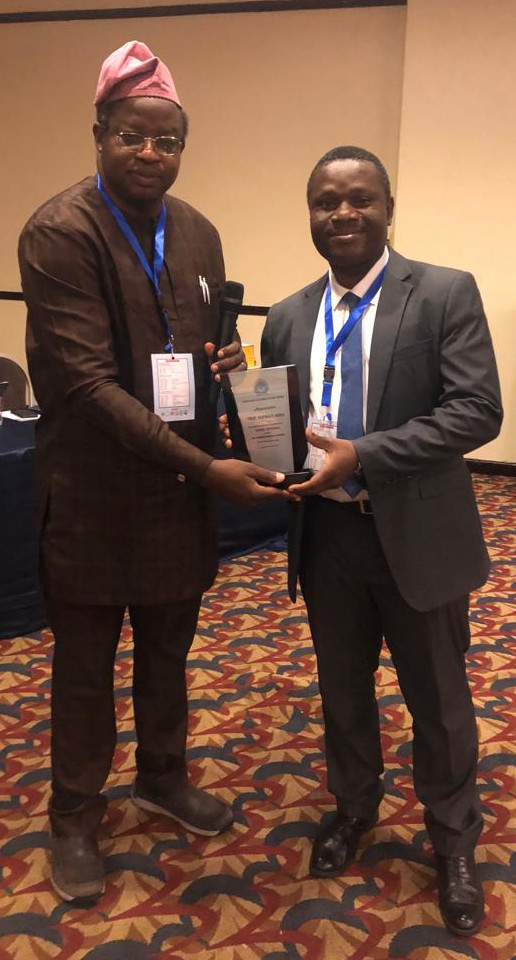
You can view more information on the Nigeria Hub by clicking here.
UK Government Framework Highlights GSU as the Largest Surgical Collaborative in the World
Publication of the UK government’s strategy to become a world leader in improving global health discusses the role of the GSU in ‘Improving Surgical Outcomes’ case study
Created partly in response to the Sustainable Development Goals aspirations for 2030, the framework identifies shared objectives across government to strengthen global health security, reform the global health architecture, strengthen health systems in the UK and globally whilst ensuring the UK’s position as a leader in global health and science technology.
As part of the publication’s overview of the UK’s leadership on the advancement of science and technology, the framework showcases the GSU as a leading example of how the UK government are investing in global health research projects that address major global health challenges and the evolving global burden of disease.
The case study notes how the Unit’s findings have influenced global guidance for surgical services and also translated research evidence into real-world global health policy. The case study also highlights how the GSU now forms the largest surgical collaborative in the world, with work undertaken across a collaboration of surgical professionals and hospitals located in 116 countries.
You can read more on the UK government’s strategy on becoming a global leader in improving health globally and building resilience to future threats by clicking here.
Ghana Hub Meet Stakeholders to Develop National Surgical Site Infection (SSI) Prevention Toolkit
Community Engagement and Involvement (CEI) event enables local community to work with the Ghana Hub to create a plan for the dissemination of SSI prevention
The meeting, orchestrated by the Ghana Hub took place at Holy Family Hospital in Techiman with the participants in attendance consisting of allied healthcare professionals from the Holy Family Hospital, alongside a well represented group of patients and accompanying members of the public – including patients undergoing treatment for a stoma and laparotomy.
The main objectives of the meeting were to:
- Engage patients and community members on what information would be most beneficial to include in the modules being developed
- Discuss the output (presentations, visuals) options that would be appropriate in community education
- Design a strategy to implement the modules
Discussions proved to be highly conducive for meeting the objectives identified, with various ideas and topics discussed in detail and subsequently taken on board by the Hub to help with the design and delivery of the toolkit. Some of the outcomes from the meeting included:
- Participants preference was for education on SSI prevention to start while they are at the admission stage, rather than on the day of discharge
- A phone number of a contactable designated doctor in the surgical team was identified as key for patients being referred from distant communities, to discuss any queries relating to treatment
- Relevant dates should be added to the modules due to sutures often being removed prematurely or later than expected, due to follow-up dressing not being done by the original surgical team
- Information on whether antibiotics and other medications would be given to the patients, in addition to information provided on benefits of the drug given and associated side-effects
- Recommended that facility managers address perceptions of patients regarding the rumoured attitude of staff towards patients that led to some delaying in seeking care
- General information should be included on how to prevent complications, other than SSIs
During the meeting, patients suggested that educational content could be delivered in the form of visual leaflets, handed over to patients at the point of discharge. Other resources that were decided on were educational videos made for the hospitals delivering care and a picture catalogue on SSI prevention that could be used by healthcare workers to educate patients on the subject during their stay in hospital.
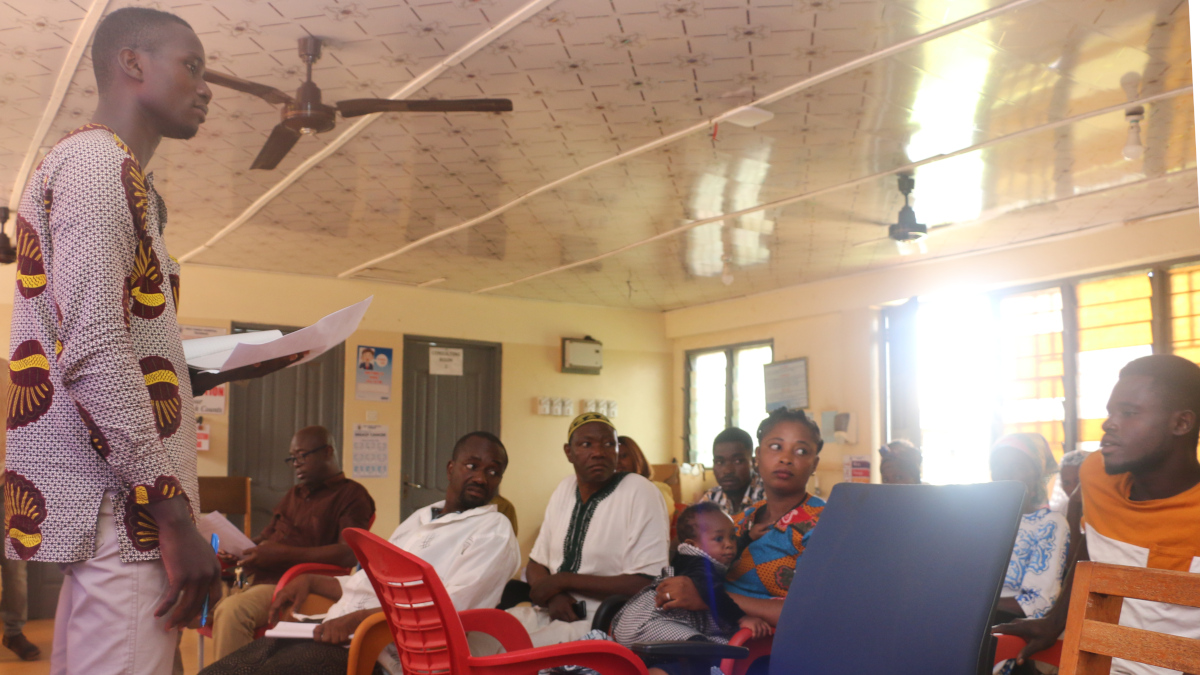
You can find out more information on SSIs by visiting the FALCON and CHEETAH trial pages.








